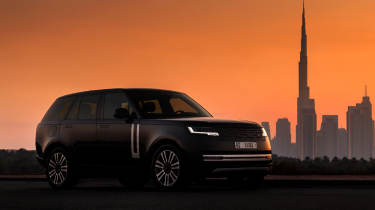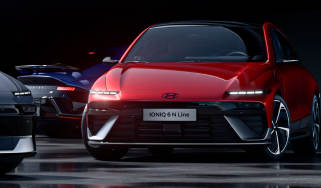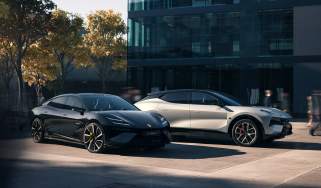Range Rover Electric testing continues in Dubai
The first all-electric version of the long-serving flagship approaches, with client reservations beginning in 2025
As we near the end of 2024, the Range Rover Electric cometh. The much-anticipated model is making its final approach, following delays earlier in the year, with client reservations and potentially a reveal, set to take place in 2025.
The car at present is undergoing extensive durability and performance testing, taking on all conditions and temperatures in the refinement process. In these latest images, we can see a prototype taking on the dunes and urban sprawl that you’ll only find alongside one another in Dubai, after first seeing the car cold weather testing earlier this year.
> Range Rover Sport SV 2024 review – the new king of SUVs?
We’re still yet to see its design in full, but these latest images offer our best look yet at what sets the EV apart from its combustion alternatives. What’s clear to see is that not much has changed at all, with an aero-centric front grille and charging flap the only noticeable new additions.
Featuring what JLR describes as ‘its newest and most intelligent thermal management system’, the Range Rover Electric prototype has been put to the test in temperatures that reach 50C, with humidity of up to 90 per cent.
In addition to testing the car’s ability to manage its system temperatures, as important is how the car looks after cabin occupants. The driver and passengers of a Range Rover Electric should be able to traverse searing dunes in consummate air-conditioned comfort without the car underneath them showing signs of performance fatigue.
The Range Rover Electric will feature a new Intelligent Torque Management system, that manages wheel slip individually, reducing wheel reaction times to as little as a single millisecond, down from 100 milliseconds. Testing of these systems can be seen in the images, as the Range Rover is flung across the 300ft dunes of the Sharjah Al Badayer desert.
Thomas Müller, Executive Director, Product Engineering said: ‘A hot climate is one of the most challenging for any battery electric vehicle, because of the need to cool the cabin and optimise battery performance at the same time.
‘The additional challenge of driving on sand requires controlled low-speed torque, so our specially developed traction control and thermal management systems work in harmony to ensure power delivery is unaffected. Our tests have shown that in this climate, repeatedly driving the equivalent of 100 metres uphill on fine sand, Range Rover Electric matches the performance of its ICE equivalents; in some instances, even surpassing them – thanks to the introduction of these new features.’
No hard figures, to do with battery sizes, charging speeds, range, weight or performance have been confirmed as yet. We know that the model is expected to fall in-line with the 523bhp V8-powered Range Rover P530 in terms of outright pace. The electric Range Rover won’t focus on 0-62mph times though, instead claiming to be the quietest, most refined Range Rover ever produced – while the lack of an engine will certainly help in this department, clever active noise cancellation technology will also help to eliminate unwanted cabin sounds for occupants. More details are expected to follow, as the car’s reveal draws closer.









